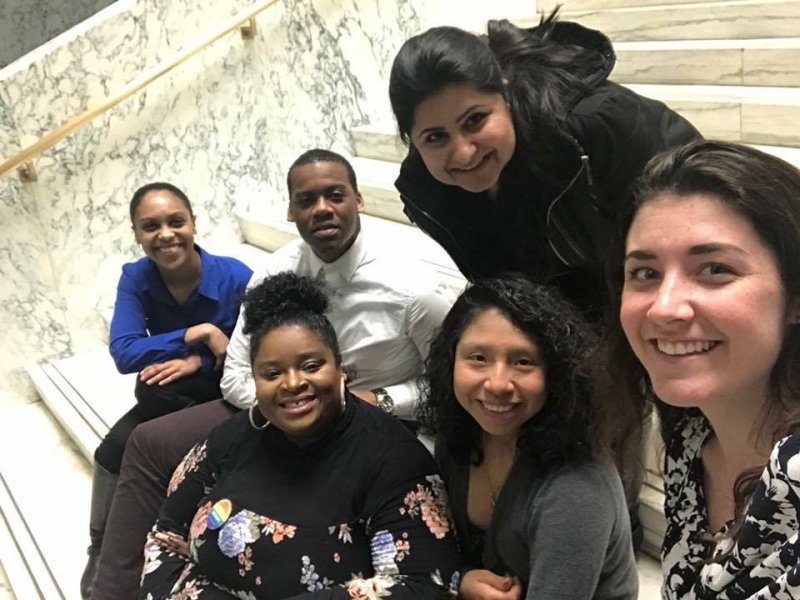Beyond the classroom
Research helps faculty reach underserved students.

Like any professor, Assistant Professor John Zilvinskis spends a good portion of his day teaching and working with University students. However, his research interests and his background mean that he also studies students just like the ones he’s teaching.
He is a member of Binghamton University’s Student Affairs Administration Department, which focuses on researching and teaching best practices for student outcomes in a university setting.
Understanding which university practices are most beneficial or detrimental can be difficult to quantify, but Zilvinskis has plenty of experience working with the National Survey of Student Engagement (NSSE).
The NSSE is an annual survey that collects information from students about their participation in programs and activities at the four-year colleges and universities they attend. This wide-reaching survey is administered by the Center for Postsecondary Research at Indiana University.
It’s no coincidence that Zilvinskis earned his PhD there.
At Indiana University, he gained first-hand insight into how best to analyze the results of the survey. He even assessed the validity of an updated version of the survey in an article published in Research in Higher Education in 2017.
Now he uses those skills for his research and to further the research of his Binghamton colleagues.
Recently, Zilvinskis has been focusing on what are called high-impact practices. Those include undergraduate research, internships, study abroad programs, senior capstone projects and living in a learning community.
They are considered high impact because of their perceived effect on students.
“The idea of most of these high-impact practices is to enhance the educational outcomes of students. The survey gives us a chance to see if and how high-impact practices make a difference, whether that be positive or negative,” Zilvinskis says.
In particular, he is focusing on how these high-impact practices affect underserved students — students who may have transferred, have a disability or served in the military.
“Transfer students, for example, may be seen as unengaged or disconnected from the university they transfer to. Their experiences with high-impact practices can be as different as night and day when compared to the experiences of students who spend all four years at the same university,” Zilvinskis says.
Understanding the effect of high-impact practices can help universities determine which programs are worth investments of time and effort and which might need to be adjusted to better serve a diverse group of students.
For example, universities want to increase engagement and make transfer students feel more welcome, but not everyone knows the best way to do that.
Zilvinskis is working with data from the 2015 and 2016 surveys — more than a quarter of a million responses — to find the solution. His findings will be published in the peer-reviewed journal Community College Review this summer.
Based on his analysis of the data so far, the practice that most influences transfer-student engagement is student-faculty interaction.
“We found that student-faculty interaction was the most important factor for encouraging transfer students to participate in more high-impact practices. Educators play an important role as advocates and supporters of students, and they can lead university policy development by championing the needs of transfer students,” he says.
Inclusive and quantitative success
With Zilvinskis’ expertise, other professors have been able to expand their research.
Deborah Taub, pro-fessor and chair of the Department of Student Affairs Administration, and some graduate students, in collaboration with Zilvinskis, have been looking at the NSSE results to understand more about students with disabilities.
“We don’t want to contribute to any type of stigma or a harmful narrative, because there are a lot of misconceptions about what it means to be a student with disabilities,” Zilvinskis says.
“Our team is trying to find ways for these students to have successful college experiences.”
Taub is hoping to find out which types of engagement can be particularly helpful for students with disabilities. The ultimate goal is to increase the GPA, positive experiences and overall outcomes of those students.
Veterans helping veterans
Assistant Professor Natesha Smith is a military veteran who wants to understand more about the engagement of veteran students and their dependents.
“It wasn’t until after the post-9/11 GI Bill was introduced that NSSE added a question about veteran status to the 2010 survey,” Smith explains, so research so far has been sparse.
In collaboration with Zilvinskis, Smith will be using NSSE data to understand how campus environments, the quality of interactions and the overall perception of a university affects outcomes for this population of students.
Smith previously used qualitative research methods to explore the experiences of female veterans on campus. Her work with Zilvinskis and the NSSE data will be a way to incorporate the quantitative side of things.
Zilvinskis says he’s excited to use this fairly new data from the NSSE survey and that Smith’s personal and professional experience helps more clearly inform their research.
The work of Zilvinskis, Taub and Smith will not only further their field but also affect how Binghamton University interacts with underserved students.
Based on their research and expertise on high-impact practices and nontraditional students, Binghamton University will be able to understand the needs of populations that are sometimes overlooked and encourage practices that can help increase both engagement and retention.

